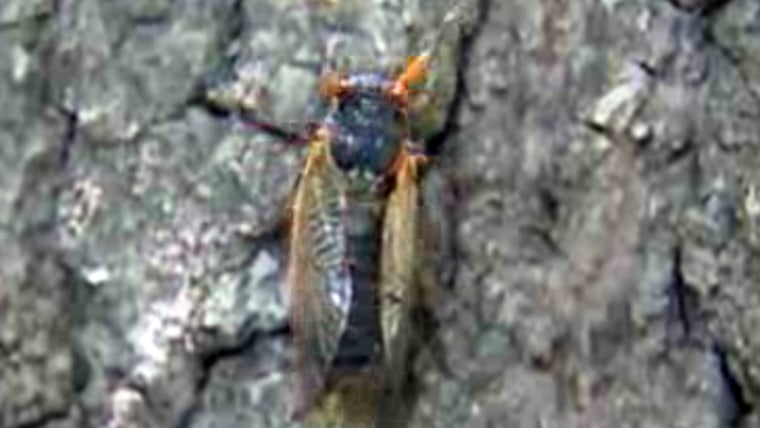The cicadas are coming any day now. Neighbors are talking. Garden centers are selling netting. Kids and other Brood X virgins are waiting and wondering.
These aren’t your average summer cicadas, which pop up here and there, fly around and make a little noise. No, the 17-year variety are periodical cicadas, which means they do everything bigger and better. There will soon be billions of them throughout the Eastern and Midwestern U.S., including my hometown of Cincinnati, while other broods will emerge in the South.
Despite the noise and the carnage of dead cicada bodies, it is a bit of a magic experience. Their genus name, after all, is magicicada.
Those of us who have lived through the strange infestations before are telling our war stories.
“I remember their crusty shells were all over the playground and the kids were freaked out!”
“Oh my God, one flew into my car while I was driving! Never have your car windows rolled down!”
“They were so loud that we didn’t want to go outside. You won’t believe the noise!”
My son is nearly 13, which is the exact age I was during the first cicada cycle I lived through. He’s not so curious because it doesn’t involve Fortnite.
“Just wait until you see them all over the trampoline,” I say.
“Yeah, yeah,” he says. It takes more to impress him than some swarm of oversized bugs that last emerged before there were even iPhones.
My 10-year-daughter, on the other hand, asks with dread every day, “Are they here yet?” She has a bug phobia we’re working through. “They won’t hurt you. They’re dumb and clumsy and you’ll mostly just be annoyed by them.”
I say this to assuage her fears, but I know they’re not dumb at all. I actually think they’re kind of brilliant, if for no other reason than their ability to act like mini-time capsules, pushing through the soil to remind us of earlier versions of ourselves and our world.
The first time I experienced them, in 1987, all of the most important people in my life were still alive. My dad sat on the deck in the evenings, reading the paper. I did cartwheels in the backyard grass, trying to avoid the crusty shells littered everywhere, and pondered what eighth grade would be like.
The next time they came, in 2004, I was single and free, living in an urban apartment and dodging cicadas during happy hour on summer patios with friends.
And now, here I am again — back in a different suburban backyard. I’ve lost both my dad and a sibling to death, but I’ve gained a husband and two small people — plus a trampoline that I already know the cicadas are going to love.
How do they do it? How do they live this curious 17-year life cycle while the rest of us experience the ups and downs and hellos and goodbyes of life? The scientific answer is that they are programmed to. But the poetic answer is that they have the notion of timing perfected. Sure, they assault your ears, but if you can get past their cacophony, I imagine you might hear them say, Hey man, just live your life and stop trying to game the time system.
I really need this message now, because after the year we had in 2020, the thought of where we might be in 2038 is terrifying. What will become of the planet? Who else might I lose? What will life be like for 64-year-old Judi?
But then there are the cicadas, sounding like they’re harmonizing around that old Pete Seeger song based on Ecclesiastes and popularized by the Byrds, about everything having a season. Live in the moment without trying to predict what’s next, they say. Look at us, emerging only every 17 years and spending our entire time above ground singing, not bemoaning the passage of time! As it happens, the 17-year cicadas actually inspired a Bob Dylan song in 1970, called “Day of the Locusts,” even though they’re not really locusts.
I tell this to my daughter, but she doesn’t care about folk songs. So I remind her that cicadas don’t bite or sting. “They’re just there.” I don’t say that by “there,” I really mean “everywhere.” Some things it’s best to just experience.
And despite the noise and the carnage of dead cicada bodies, it is a bit of a magic experience. Their genus name, after all, is magicicada.
The show starts when the nymphs, the adolescent cicadas who have been living underground and eating tree roots all these years, emerge en masse from the soil when the ground temperature reaches about 64 degrees. They creep out of their nymph skins and become full-fledged cicadas with bulging red eyes and wings that have a 3-inch wingspan.
Then it’s time to find a mate. And the best way to do that is to make a lot of noise. So that’s exactly what the males do: sing together to attract females. Very, very loudly. After they mate, the females lay eggs in trees. The nymphs hatch, fall to the ground, burrow under the soil and wait 17 years for the whole thing to happen again while the world rushes by above them.
Every day, the soil is warming. It won’t be long now. It is the season, after all. The birds and the Byrds are singing in my ear.
Source: | This article originally belongs to Nbcnews.com











